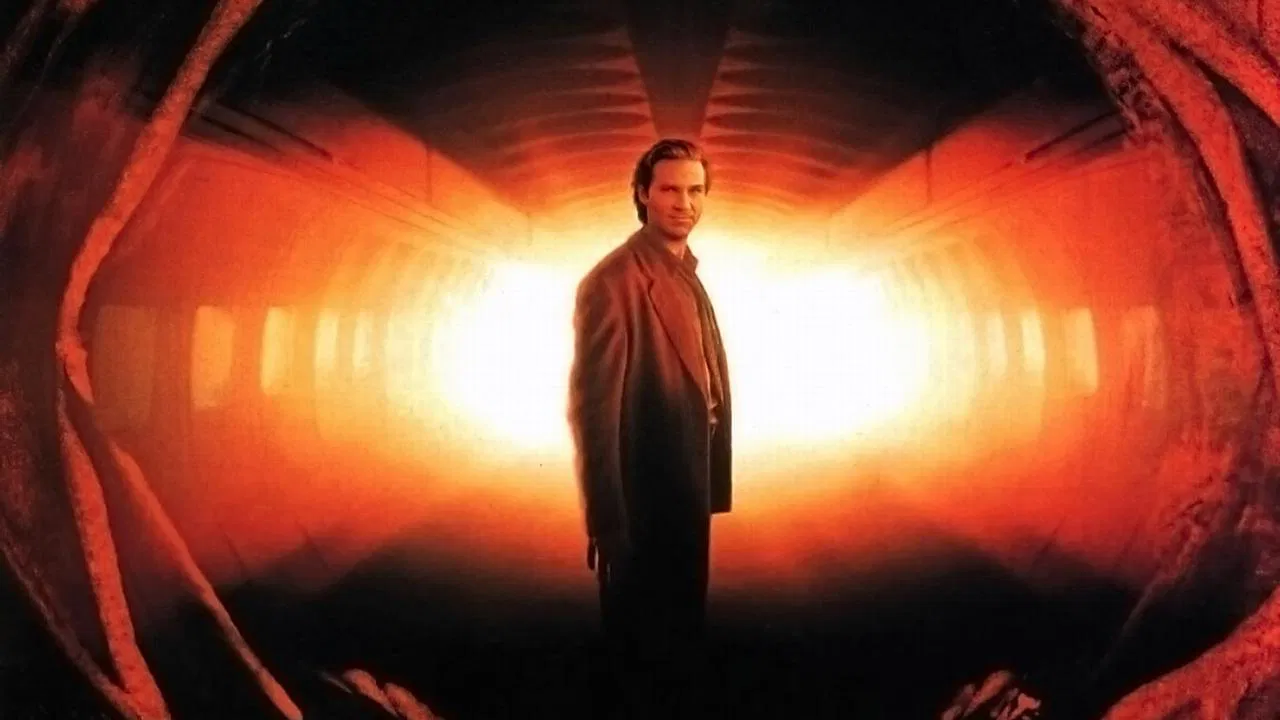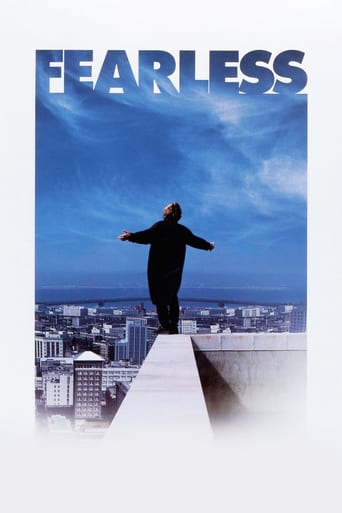

The movie tells the story of the survivor of an air plane accident that has actually taken place in Sioux City. Jeff Bridges was never better than here and he captured me with his amazing performance. What I liked the most in the film is that it made me think that the battles we give every day in our lives, in order to face our problems, are battles we just have to give, because that's what life is about. A must see!
... View More"Fearless" is a powerful movie. From the terrifying crash sequence to Jeff Bridges walk on a roof top and his physics lesson for the benefit of Rosie Perez, "Fearless" owes its considerable emotional impact to the Rafael Yglesias novel of the same name. No surprise since Yglesias wrote the screenplay.What I found surprising is that Yglesias did not receive even a nomination for the screenplay. "Schindler's List" won, but I still ask, how did "Fearless" not receive a nomination? Bridges, Isabella Rossellini and Perez brought the script to life with brilliant performances, but the story of "Fearless" is in the story. It is a rare examination of the effect of experience on human behavior and personality, and the courage that a few find in those experiences. Insanity never was so valuable as it is in "Fearless."
... View More"Fearless" awakened one of the most bizarre thoughts that ever crossed my mind: envy toward people who lived near death experiences, for the certitude that these people would never be the same again, and when you try to be someone else, any option is worth considering."Fearless" takes place during the aftermath of a plane crash that presumably killed most passengers and left a few survivors in a state of shock. Are they privileged? Maybe from our standpoint, but most of them would endure the trauma of having witnessed the death of a friend, a parent or 'just' the seat neighbor. Most of them would endure the survivor's guilt, not to mention the traumatic landing and the subsequent lottery of death. Peter Weir's movie, based on a novel by Rafael Iglesias, explores the complexities of the human soul from the different ways it reacts to a life-changing experience. The most intriguing case is Max Klein, an architect and family man, played by Jeff Bridges. Around him, it's chaos, mayhem, panic, cries and cadavers yet he walks along the site, like floating on a cloud of extraordinary serenity. He's not just a survivor, but also a savior, he gives a baby back to his mom, helps a little boy who was flying alone, and shows the safe way to many distraught passengers. Yet, the film doesn't focus on his heroic status, which he himself declines, it is more about the perception of life and death when you have been walking on the thin tightrope that separate the two worlds, when you 'saw the tunnel leading to a light'.Speaking of 'light', the narrative is punctuated by a few flashbacks that reveal how normally scared Max was during the flight, while sitting next to his best friend and colleague. It's only after the situation got more critical, that a mysterious heavenly light appeased his thoughts, and filled his heart with the serene confidence he would live. The crash sequence, which is among one of the most realistic, haunting and emotional from any other film, give some interesting insights that are later 'contradicted' by Max. The way he sees it: he's already a ghost, God can't touch him, he shares the little secret with Carla, a Hispanic mother who lost her child and can't recover from the guilt of not having held him more tightly in her arms. Max and Carla form two interesting cases. Max survived and believe he's invulnerable, 'fearless' as the title suggests, with an inexorable desire to live life to its fullest, and the consequence is that it affects its relationships with his entourage. He becomes totally estranged to his wife, played by Isabella Rosselini (whose uncanny resemblance with her legendary mother was almost distracting), he lost the fatherly bond with his son in favor of the one he rescued, he couldn't even find the right words for his friend's widow or cooperate with the lawyer's desperate efforts to obtain a huge indemnity. Max rejects life's normality: money, convention, fear, video games; living with memories as his idea of the perfect life is a personal utopia that can only be fulfilled with someone who understands him. And this person is Carla. Played by Rosie Perez, Carla is the emotional core of the film, through the reaction most viewers can relate to, she's not a kind of super-human or angel, she only tried to save her son but failed. And this failure puts her in a depressive state with suicidal impulses that only her deep Hispanic Catholic faith can alter. Contrarily to Max, Carla is much aware that she's living and that's what makes her life unbearable, for Max, the idea of death is so intolerable that he teases it by eating strawberries, a fruit he's allergic to, crossing the road, or walking on the ledge of a building's roof in the film's most emblematic scene. Fear is connected with self-preservation, but in Max' case, the fearless state doesn't mean he doesn't want to live, but it betrays his sentiment of inner immortality, yet the only way to be immortal is to be actually dead. In fact, Max is still between life and death. Either the wish to be dead out of guilt or sensation of being already dead from a weird exhilaration, both Perez and Bridges drive the film through sensitive and sensational performances. The therapist, played by John Turturro, explains to Max' wife that he and Carla represent two extremes in terms of reactions and on their interactions chances of recovery depend. The relationship has a romantic vibe and maybe Max genuinely loves Carla, but "Fearless" never lures us into the idea that Carla would fall in love with him on the simple basis that they had the same experience. Love is not an end but a mean for Max to suppress all the traces of guilt in Carla's mind. Ironically, that's what Max' wife tries to do, helping him to regain his faith in life, and her many attempts to give a helping hand are concluded by 'failure to communicate', leading to what seems to be marital dead-end. But there is a reason Rosie Perez' performance was so acclaimed, she's not just a weepy, mourning mother, there is strength in her heart, and if her recovery can put an end to the mystical bond she had with Max, it leaves at least some room for the woman who really loves him. The conclusion of "Fearless", perhaps one of the most emotionally satisfying ever, is perfect because it does three things: it provides some answers about Max' enigmatic state of mind, finds the perfect remedy, and highlights the truth that one of the best things about life is to realize how great it is to live. Those who faced death have more awareness, and maybe this is what I consider their privilege. Do I want it? I'm not sure I'm that fearless.
... View MoreFearless is a fascinating movie about the thin line between fear and rationality. Fear is so much more difficult to overpower, or even sometimes be conscious of, than reason that when we do overpower fear, it is not necessarily replaced by reason, but by exhilarating mania. Jeff Bridges, in one of his best performances, covers a lot of ground in his character, a survivor of a plane crash. Many die, including his business partner. The catastrophe metamorphoses his whole life thereafter. He enters an enhanced perceptive condition, believing he is dead, beginning to rethink life, death, God and the afterlife.Bridges becomes addicted to walking a tightrope over death because it makes him feel as alive and enlightened as he possibly can. But this also dwindles his connection to his family and his life. He begins to have difficulty recognizing the limits of mortality, in some way perceiving himself as more than mere flesh and blood. Rosie Perez, however, in a performance equaling Bridges' in personal reconciliation with her role, plays another survivor, whose baby son she failed to protect from death by the crash. In her own aftermath, she is the unmistakable foil to Bridges' expansive superman complex as a mother who loses all will to live.The two find themselves bonding, sharing a connection that transcends the love we tend to understand, or that Isabella Rossellini, as Bridges' wife, and Benicio Del Toro, as Perez's husband, tend to understand. And as Bridges begins to reach the dangerous peak of his high on existence, Perez is forced to make amends with the world, taking control of shaping herself. The film is a boundless interpretation of an all-encompassingly utilitarian philosophy, a kind of precept that amalgamates the black and white duality of unflappable idealism and hopeless despair.There are peripheral nebbishy professionals played in bit parts by a gregarious Tom Hulce and John Turturro who has as a virtually futile psychologist-for-hire a sort of ironic missionary zeal. We hear Gorecki's beautiful major string orchestra sound. But the film would not have the same kind of clarity, or perhaps even the same themes, without the articulately detailed cinematic expression of Rafael Yglesias' material by the director, Peter Weir.
... View More